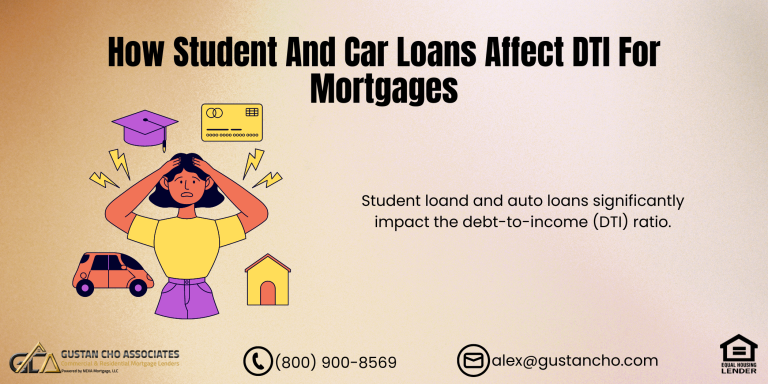This ARTICLE On First Time Home Buyers With Student Loan Debts Mortgage Guidelines Was PUBLISHED On September 24th, 2019
High student loan debt is one of the barriers affecting first time home buyers.
- Student loans and auto payments are the two largest factors that impact debt to income ratios
- FHA, USDA, VA, Fannie Mae, Freddie Mac realize the fact that First Time Home Buyers with Student Loan Debts often disqualify borrowers from qualifying for mortgages
- There are new First Time Home Buyers with Student Loan Debts Mortgage Guidelines that took effect on September 23rd, 2019
- In general, all loan programs required deferred student loan debts counted when underwriters calculate DTI
- This was done by taking 1.0% of the student loan balance and use that figure as a monthly hypothetical debt
- This rule applied for FHA, USDA, and Conventional Loans. VA has its separate student loan guidelines
In this article, we will cover and discuss First Time Home Buyers with Student Loan Debts.
Freddie Mac First Time Home Buyers With Student Loan Debts
Freddie Mac has new Freddie Mac First Time Home Buyers With Student Loan Debts Mortgage Guidelines.
- Freddie Mac will now require either the monthly student loan payment be counted in calculating debt to income ratios
- If the student loan is in deferment and/or the borrower is still in school, then 0.50% of the outstanding student loan balance needs to be used as a monthly hypothetical debt in DTI Calculations
- Either the monthly scheduled payment and/or 0.50% of the outstanding student loan balance, whichever is higher
- The new guidelines are different than the current guidelines that allow the student loan payment reported on the credit bureaus to be used
Borrowers with an IBR Payment can either use the IBR payment reporting on the credit report or the 0.5% of the outstanding student balance, whichever is higher.
Case Scenario With New UPDATED Freddie Mac Student Loan Guidelines

Let’s take a case scenario where a borrower has a $100,000 outstanding balance on their student loans.
- Let’s assume the borrower has a $50 per month IBR Payment
- Under the current guidelines, the underwriter can count the $50 per month IBR Payment in DTI Calculations
- However, with the new Freddie Mac Guidelines, $500 needs to be used instead of $50
- This is because the 0.50% of $100,000 ($500) is higher than the $50 IBR Payment
- On another note, Freddie Mac will no longer allow $0 IBR Payments. This new guideline takes effect on January 1st, 2020
USDA Loans will have the same student loan guidelines as Freddie Mac where 0.50% will be used for DTI Calculations.
USDA Home Loans now require .5% just like Freddie Mac. Fannie Mae Guidelines allow IBR Payments, including $0 IBR Payments that report on credit reports.
FHA Guidelines On Student Loans
HUD, the parent of FHA, no longer exempts deferred student loans.
Here is how FHA Student Loan Guidelines work:
- Fully amortized monthly payments over an extended term are allowed
- If the borrower has deferred student loans, then the mortgage underwriter will take 1.0% of the outstanding student loan balance and use it as a hypothetical debt
- OR, the borrower can get a hypothetical fully amortized monthly debt payment over an extended term
- That figure can be used in lieu of the 1%
- The fully amortized hypothetical monthly debt payments need to be in writing by the student loan provider
For more information about this topic, please contact us at 800-900-8569 or text us for faster response. Or email us at gcho@gustancho.com.
VA Student Loan Guidelines
The VA does exempt deferred student loans that have been deferred for longer than 12 months from debt to income ratio calculations.
- If the student loan is not deferred, then the VA will require the mortgage underwriter to take 5% of the outstanding loan balance and divide that figure by 12 months
The resulting figure will be the hypothetical monthly debt used for debt to income ratio calculations on VA Loans.
More Millennials And Rents Are Purchasing New Homes
More and more millennials and renters are becoming first time home buyers.
- In the past three years, the homeownership rate has been steadily increasing
- Data states that 65% of the population are homeowners
- In many instances, a home mortgage is cheaper than renting
- Rents have been increasing in the past 5 years
- Rents have increased by 35% in the past 60 months
- 34% of homebuyers are folks under 36 years of age
- Over 95% of homebuyers aged 36 years and younger have a mortgage on their home purchases
- The biggest hurdle for most homebuyers is coming up with the down payment
- Statistics report that 70% of Americans have less than $1,000 in savings
Close to 50% of homebuyers who are 36 years of age and younger are first time homebuyers.
Best Loan Program With High Student Loan Balances
The Team at Gustan Cho Associates Mortgage Group are experts in helping first-time homebuyers.
- We can help first-time homebuyers with high student loan debt qualify for mortgages
- Homebuyers with high student loan balances should go with Conventional Loans
- This is due to Conventional Loans accepting Income-Based-Repayment programs
Fannie Mae is the best loan program for borrowers with IBR Payments and high student loan balances.
Other Changes In Agency Mortgage Guidelines
Borrowers with high debt to income ratios often do not go with conventional loans. However, things have changed. Fannie Mae now allows up to 50% debt to income ratios. Freddie Mac has increased the debt to income ratio ceiling to 50.49%. To compete with FHA’s 3.5% down payment program, Fannie Mae HomeReady and Freddie Mac Home Possible were launched so buyers can qualify for conventional loans with 3% down payment. For more information about this article and/or other mortgage-related topics, please contact us at 800-900-8569 or text us for faster response. Or email us at gcho@gustancho.com.








